International Business Project: Germany - BUS 496 Analysis
VerifiedAdded on 2022/08/13
|13
|2978
|14
Project
AI Summary
This project analyzes Germany's international business environment, addressing key aspects as outlined in the assignment brief. Section 1 examines Germany's role as a home base for multinational corporations, the influence of globalization on jobs, wages, income inequality, cultural sovereignty, and environmental factors, the country's globalization ranking, and the benefits it offers to businesses. Section 2 explores Germany's ethnic diversity, cultural traditions, customs, social structure, and business culture, including work ethics and recent socio-political shifts. Section 3 delves into Germany's political and economic systems, including its federal republic structure, economic policies, legal system, and the government's influence on the economy, and its corruption perception. Section 4 assesses Germany's economic development, GDP, human development index, economic trends, and the impact of economic policies on trade. The project utilizes in-text citations and adheres to the specified formatting guidelines, including double-spacing, a serif typeface, and a cover page with required information. The analysis aims to provide a comprehensive overview of Germany's international business landscape, fulfilling the requirements of the BUS 496 project.
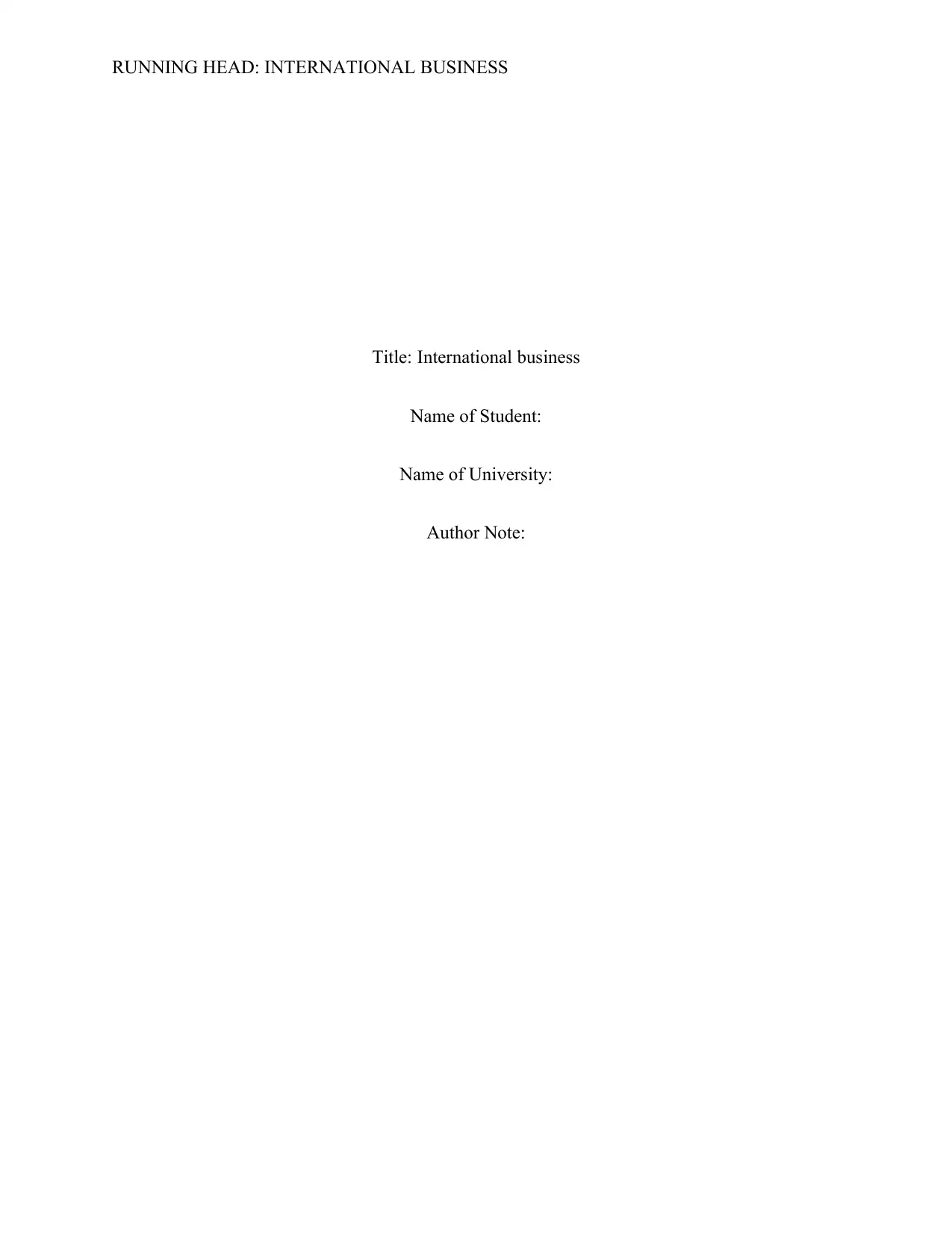
RUNNING HEAD: INTERNATIONAL BUSINESS
Title: International business
Name of Student:
Name of University:
Author Note:
Title: International business
Name of Student:
Name of University:
Author Note:
Paraphrase This Document
Need a fresh take? Get an instant paraphrase of this document with our AI Paraphraser
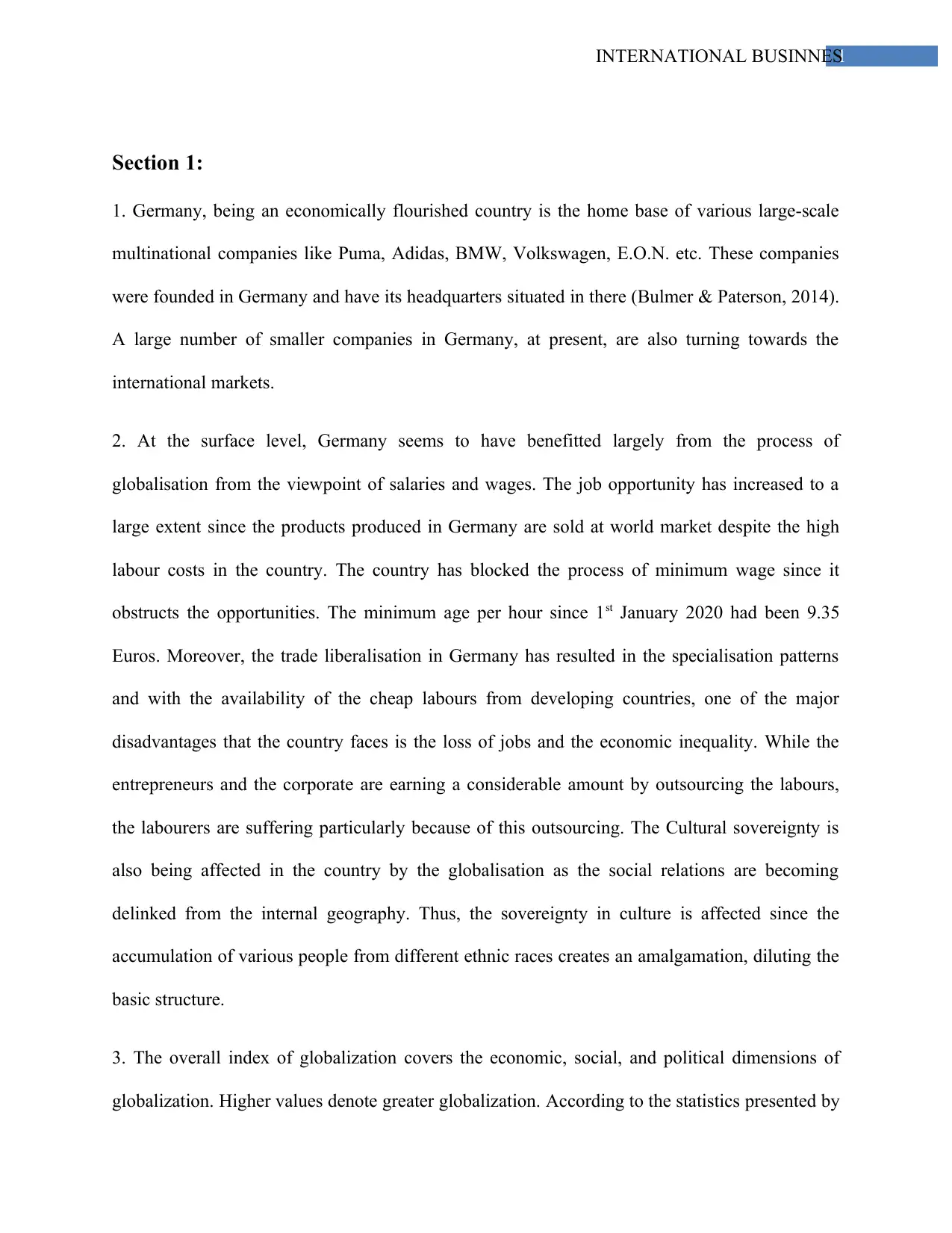
1INTERNATIONAL BUSINNES
Section 1:
1. Germany, being an economically flourished country is the home base of various large-scale
multinational companies like Puma, Adidas, BMW, Volkswagen, E.O.N. etc. These companies
were founded in Germany and have its headquarters situated in there (Bulmer & Paterson, 2014).
A large number of smaller companies in Germany, at present, are also turning towards the
international markets.
2. At the surface level, Germany seems to have benefitted largely from the process of
globalisation from the viewpoint of salaries and wages. The job opportunity has increased to a
large extent since the products produced in Germany are sold at world market despite the high
labour costs in the country. The country has blocked the process of minimum wage since it
obstructs the opportunities. The minimum age per hour since 1st January 2020 had been 9.35
Euros. Moreover, the trade liberalisation in Germany has resulted in the specialisation patterns
and with the availability of the cheap labours from developing countries, one of the major
disadvantages that the country faces is the loss of jobs and the economic inequality. While the
entrepreneurs and the corporate are earning a considerable amount by outsourcing the labours,
the labourers are suffering particularly because of this outsourcing. The Cultural sovereignty is
also being affected in the country by the globalisation as the social relations are becoming
delinked from the internal geography. Thus, the sovereignty in culture is affected since the
accumulation of various people from different ethnic races creates an amalgamation, diluting the
basic structure.
3. The overall index of globalization covers the economic, social, and political dimensions of
globalization. Higher values denote greater globalization. According to the statistics presented by
Section 1:
1. Germany, being an economically flourished country is the home base of various large-scale
multinational companies like Puma, Adidas, BMW, Volkswagen, E.O.N. etc. These companies
were founded in Germany and have its headquarters situated in there (Bulmer & Paterson, 2014).
A large number of smaller companies in Germany, at present, are also turning towards the
international markets.
2. At the surface level, Germany seems to have benefitted largely from the process of
globalisation from the viewpoint of salaries and wages. The job opportunity has increased to a
large extent since the products produced in Germany are sold at world market despite the high
labour costs in the country. The country has blocked the process of minimum wage since it
obstructs the opportunities. The minimum age per hour since 1st January 2020 had been 9.35
Euros. Moreover, the trade liberalisation in Germany has resulted in the specialisation patterns
and with the availability of the cheap labours from developing countries, one of the major
disadvantages that the country faces is the loss of jobs and the economic inequality. While the
entrepreneurs and the corporate are earning a considerable amount by outsourcing the labours,
the labourers are suffering particularly because of this outsourcing. The Cultural sovereignty is
also being affected in the country by the globalisation as the social relations are becoming
delinked from the internal geography. Thus, the sovereignty in culture is affected since the
accumulation of various people from different ethnic races creates an amalgamation, diluting the
basic structure.
3. The overall index of globalization covers the economic, social, and political dimensions of
globalization. Higher values denote greater globalization. According to the statistics presented by
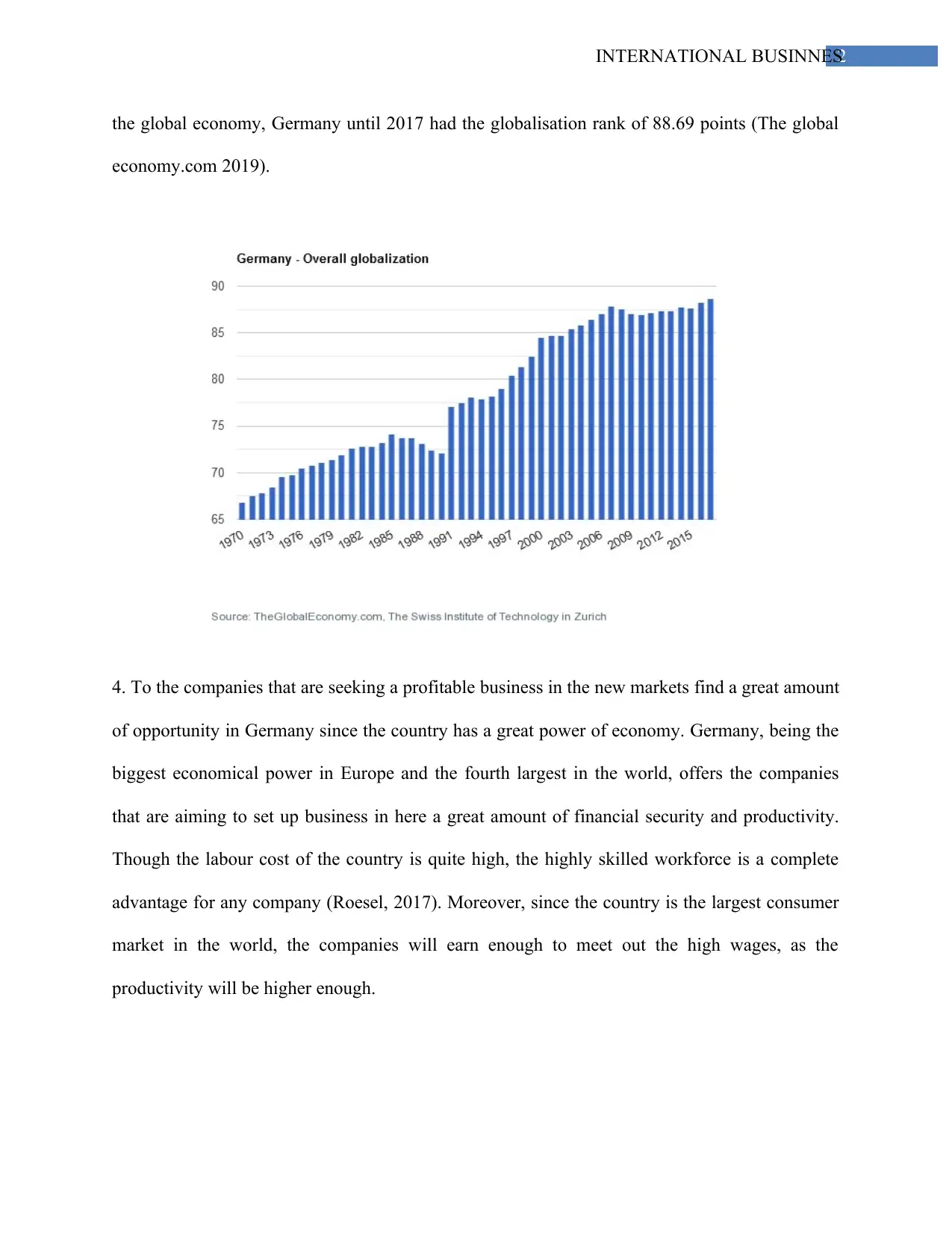
2INTERNATIONAL BUSINNES
the global economy, Germany until 2017 had the globalisation rank of 88.69 points (The global
economy.com 2019).
4. To the companies that are seeking a profitable business in the new markets find a great amount
of opportunity in Germany since the country has a great power of economy. Germany, being the
biggest economical power in Europe and the fourth largest in the world, offers the companies
that are aiming to set up business in here a great amount of financial security and productivity.
Though the labour cost of the country is quite high, the highly skilled workforce is a complete
advantage for any company (Roesel, 2017). Moreover, since the country is the largest consumer
market in the world, the companies will earn enough to meet out the high wages, as the
productivity will be higher enough.
the global economy, Germany until 2017 had the globalisation rank of 88.69 points (The global
economy.com 2019).
4. To the companies that are seeking a profitable business in the new markets find a great amount
of opportunity in Germany since the country has a great power of economy. Germany, being the
biggest economical power in Europe and the fourth largest in the world, offers the companies
that are aiming to set up business in here a great amount of financial security and productivity.
Though the labour cost of the country is quite high, the highly skilled workforce is a complete
advantage for any company (Roesel, 2017). Moreover, since the country is the largest consumer
market in the world, the companies will earn enough to meet out the high wages, as the
productivity will be higher enough.
⊘ This is a preview!⊘
Do you want full access?
Subscribe today to unlock all pages.

Trusted by 1+ million students worldwide
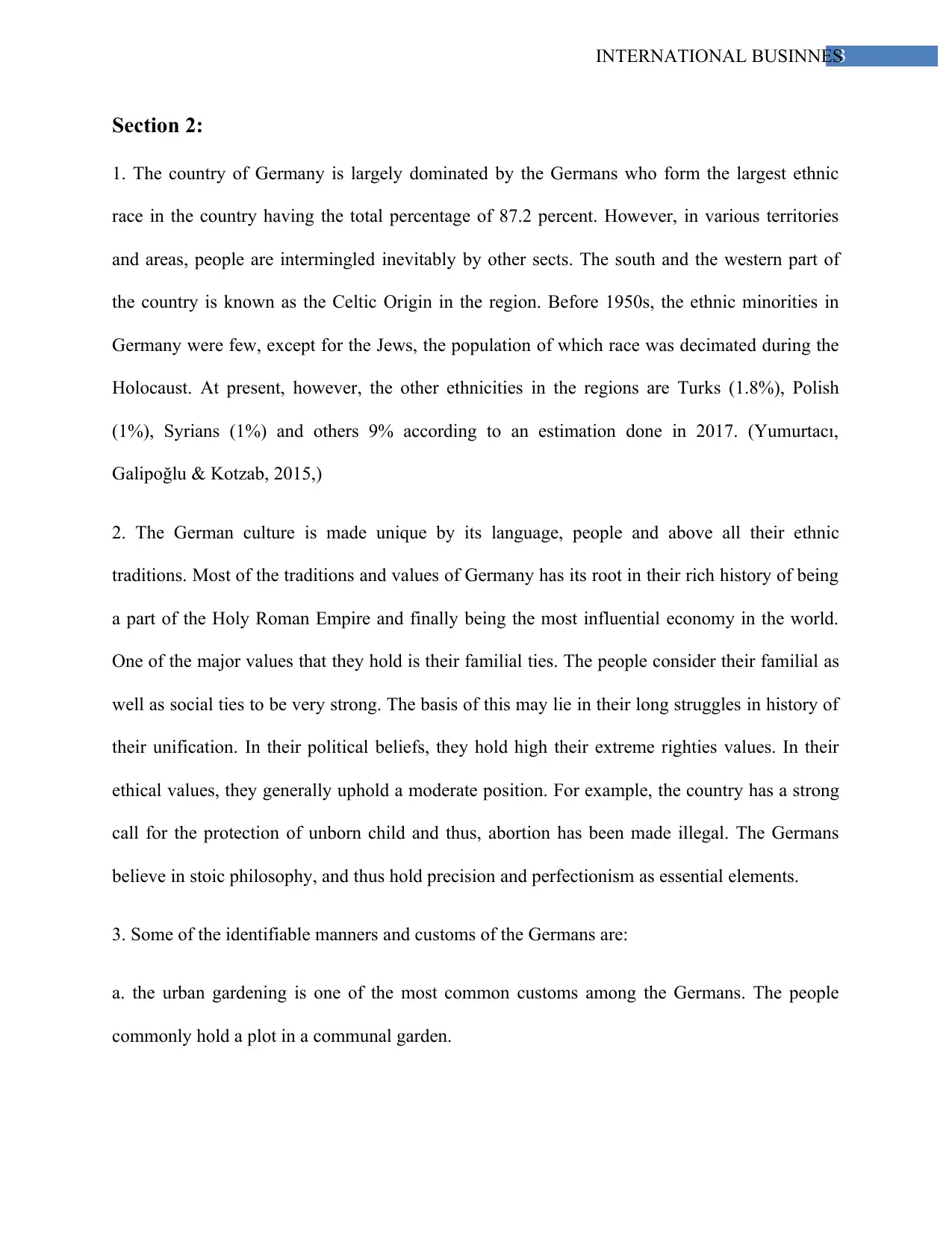
3INTERNATIONAL BUSINNES
Section 2:
1. The country of Germany is largely dominated by the Germans who form the largest ethnic
race in the country having the total percentage of 87.2 percent. However, in various territories
and areas, people are intermingled inevitably by other sects. The south and the western part of
the country is known as the Celtic Origin in the region. Before 1950s, the ethnic minorities in
Germany were few, except for the Jews, the population of which race was decimated during the
Holocaust. At present, however, the other ethnicities in the regions are Turks (1.8%), Polish
(1%), Syrians (1%) and others 9% according to an estimation done in 2017. (Yumurtacı,
Galipoğlu & Kotzab, 2015,)
2. The German culture is made unique by its language, people and above all their ethnic
traditions. Most of the traditions and values of Germany has its root in their rich history of being
a part of the Holy Roman Empire and finally being the most influential economy in the world.
One of the major values that they hold is their familial ties. The people consider their familial as
well as social ties to be very strong. The basis of this may lie in their long struggles in history of
their unification. In their political beliefs, they hold high their extreme righties values. In their
ethical values, they generally uphold a moderate position. For example, the country has a strong
call for the protection of unborn child and thus, abortion has been made illegal. The Germans
believe in stoic philosophy, and thus hold precision and perfectionism as essential elements.
3. Some of the identifiable manners and customs of the Germans are:
a. the urban gardening is one of the most common customs among the Germans. The people
commonly hold a plot in a communal garden.
Section 2:
1. The country of Germany is largely dominated by the Germans who form the largest ethnic
race in the country having the total percentage of 87.2 percent. However, in various territories
and areas, people are intermingled inevitably by other sects. The south and the western part of
the country is known as the Celtic Origin in the region. Before 1950s, the ethnic minorities in
Germany were few, except for the Jews, the population of which race was decimated during the
Holocaust. At present, however, the other ethnicities in the regions are Turks (1.8%), Polish
(1%), Syrians (1%) and others 9% according to an estimation done in 2017. (Yumurtacı,
Galipoğlu & Kotzab, 2015,)
2. The German culture is made unique by its language, people and above all their ethnic
traditions. Most of the traditions and values of Germany has its root in their rich history of being
a part of the Holy Roman Empire and finally being the most influential economy in the world.
One of the major values that they hold is their familial ties. The people consider their familial as
well as social ties to be very strong. The basis of this may lie in their long struggles in history of
their unification. In their political beliefs, they hold high their extreme righties values. In their
ethical values, they generally uphold a moderate position. For example, the country has a strong
call for the protection of unborn child and thus, abortion has been made illegal. The Germans
believe in stoic philosophy, and thus hold precision and perfectionism as essential elements.
3. Some of the identifiable manners and customs of the Germans are:
a. the urban gardening is one of the most common customs among the Germans. The people
commonly hold a plot in a communal garden.
Paraphrase This Document
Need a fresh take? Get an instant paraphrase of this document with our AI Paraphraser
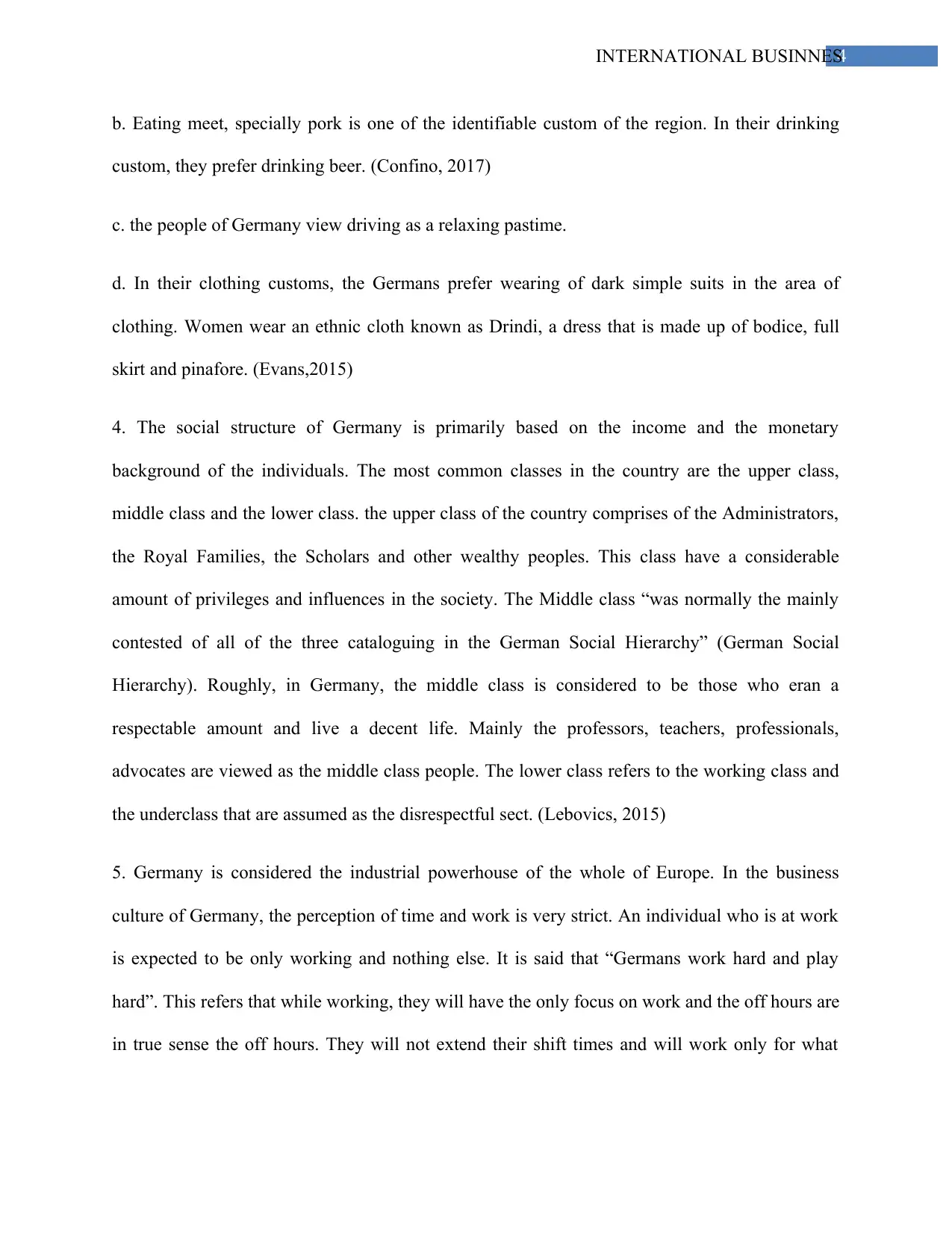
4INTERNATIONAL BUSINNES
b. Eating meet, specially pork is one of the identifiable custom of the region. In their drinking
custom, they prefer drinking beer. (Confino, 2017)
c. the people of Germany view driving as a relaxing pastime.
d. In their clothing customs, the Germans prefer wearing of dark simple suits in the area of
clothing. Women wear an ethnic cloth known as Drindi, a dress that is made up of bodice, full
skirt and pinafore. (Evans,2015)
4. The social structure of Germany is primarily based on the income and the monetary
background of the individuals. The most common classes in the country are the upper class,
middle class and the lower class. the upper class of the country comprises of the Administrators,
the Royal Families, the Scholars and other wealthy peoples. This class have a considerable
amount of privileges and influences in the society. The Middle class “was normally the mainly
contested of all of the three cataloguing in the German Social Hierarchy” (German Social
Hierarchy). Roughly, in Germany, the middle class is considered to be those who eran a
respectable amount and live a decent life. Mainly the professors, teachers, professionals,
advocates are viewed as the middle class people. The lower class refers to the working class and
the underclass that are assumed as the disrespectful sect. (Lebovics, 2015)
5. Germany is considered the industrial powerhouse of the whole of Europe. In the business
culture of Germany, the perception of time and work is very strict. An individual who is at work
is expected to be only working and nothing else. It is said that “Germans work hard and play
hard”. This refers that while working, they will have the only focus on work and the off hours are
in true sense the off hours. They will not extend their shift times and will work only for what
b. Eating meet, specially pork is one of the identifiable custom of the region. In their drinking
custom, they prefer drinking beer. (Confino, 2017)
c. the people of Germany view driving as a relaxing pastime.
d. In their clothing customs, the Germans prefer wearing of dark simple suits in the area of
clothing. Women wear an ethnic cloth known as Drindi, a dress that is made up of bodice, full
skirt and pinafore. (Evans,2015)
4. The social structure of Germany is primarily based on the income and the monetary
background of the individuals. The most common classes in the country are the upper class,
middle class and the lower class. the upper class of the country comprises of the Administrators,
the Royal Families, the Scholars and other wealthy peoples. This class have a considerable
amount of privileges and influences in the society. The Middle class “was normally the mainly
contested of all of the three cataloguing in the German Social Hierarchy” (German Social
Hierarchy). Roughly, in Germany, the middle class is considered to be those who eran a
respectable amount and live a decent life. Mainly the professors, teachers, professionals,
advocates are viewed as the middle class people. The lower class refers to the working class and
the underclass that are assumed as the disrespectful sect. (Lebovics, 2015)
5. Germany is considered the industrial powerhouse of the whole of Europe. In the business
culture of Germany, the perception of time and work is very strict. An individual who is at work
is expected to be only working and nothing else. It is said that “Germans work hard and play
hard”. This refers that while working, they will have the only focus on work and the off hours are
in true sense the off hours. They will not extend their shift times and will work only for what
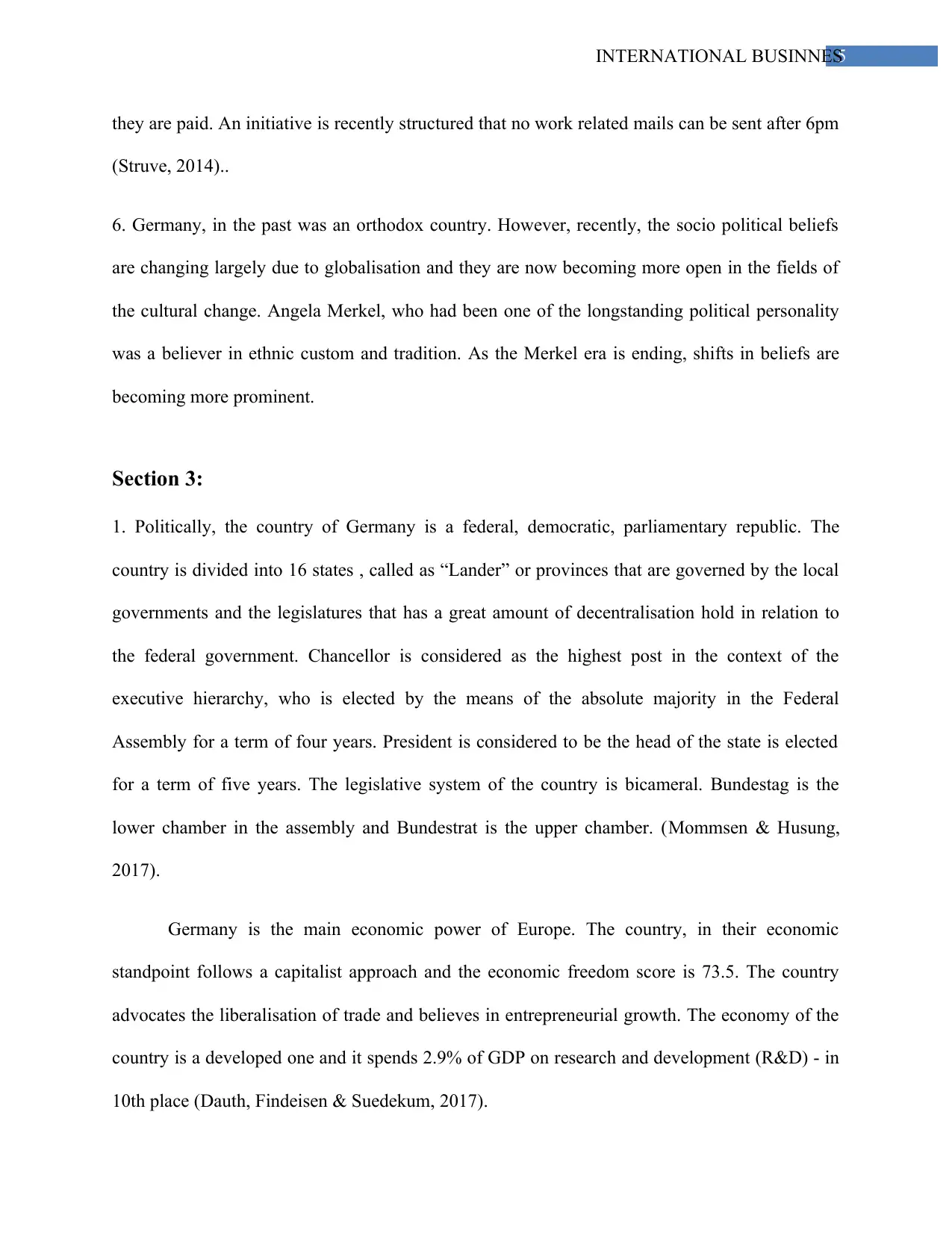
5INTERNATIONAL BUSINNES
they are paid. An initiative is recently structured that no work related mails can be sent after 6pm
(Struve, 2014)..
6. Germany, in the past was an orthodox country. However, recently, the socio political beliefs
are changing largely due to globalisation and they are now becoming more open in the fields of
the cultural change. Angela Merkel, who had been one of the longstanding political personality
was a believer in ethnic custom and tradition. As the Merkel era is ending, shifts in beliefs are
becoming more prominent.
Section 3:
1. Politically, the country of Germany is a federal, democratic, parliamentary republic. The
country is divided into 16 states , called as “Lander” or provinces that are governed by the local
governments and the legislatures that has a great amount of decentralisation hold in relation to
the federal government. Chancellor is considered as the highest post in the context of the
executive hierarchy, who is elected by the means of the absolute majority in the Federal
Assembly for a term of four years. President is considered to be the head of the state is elected
for a term of five years. The legislative system of the country is bicameral. Bundestag is the
lower chamber in the assembly and Bundestrat is the upper chamber. (Mommsen & Husung,
2017).
Germany is the main economic power of Europe. The country, in their economic
standpoint follows a capitalist approach and the economic freedom score is 73.5. The country
advocates the liberalisation of trade and believes in entrepreneurial growth. The economy of the
country is a developed one and it spends 2.9% of GDP on research and development (R&D) - in
10th place (Dauth, Findeisen & Suedekum, 2017).
they are paid. An initiative is recently structured that no work related mails can be sent after 6pm
(Struve, 2014)..
6. Germany, in the past was an orthodox country. However, recently, the socio political beliefs
are changing largely due to globalisation and they are now becoming more open in the fields of
the cultural change. Angela Merkel, who had been one of the longstanding political personality
was a believer in ethnic custom and tradition. As the Merkel era is ending, shifts in beliefs are
becoming more prominent.
Section 3:
1. Politically, the country of Germany is a federal, democratic, parliamentary republic. The
country is divided into 16 states , called as “Lander” or provinces that are governed by the local
governments and the legislatures that has a great amount of decentralisation hold in relation to
the federal government. Chancellor is considered as the highest post in the context of the
executive hierarchy, who is elected by the means of the absolute majority in the Federal
Assembly for a term of four years. President is considered to be the head of the state is elected
for a term of five years. The legislative system of the country is bicameral. Bundestag is the
lower chamber in the assembly and Bundestrat is the upper chamber. (Mommsen & Husung,
2017).
Germany is the main economic power of Europe. The country, in their economic
standpoint follows a capitalist approach and the economic freedom score is 73.5. The country
advocates the liberalisation of trade and believes in entrepreneurial growth. The economy of the
country is a developed one and it spends 2.9% of GDP on research and development (R&D) - in
10th place (Dauth, Findeisen & Suedekum, 2017).
⊘ This is a preview!⊘
Do you want full access?
Subscribe today to unlock all pages.

Trusted by 1+ million students worldwide
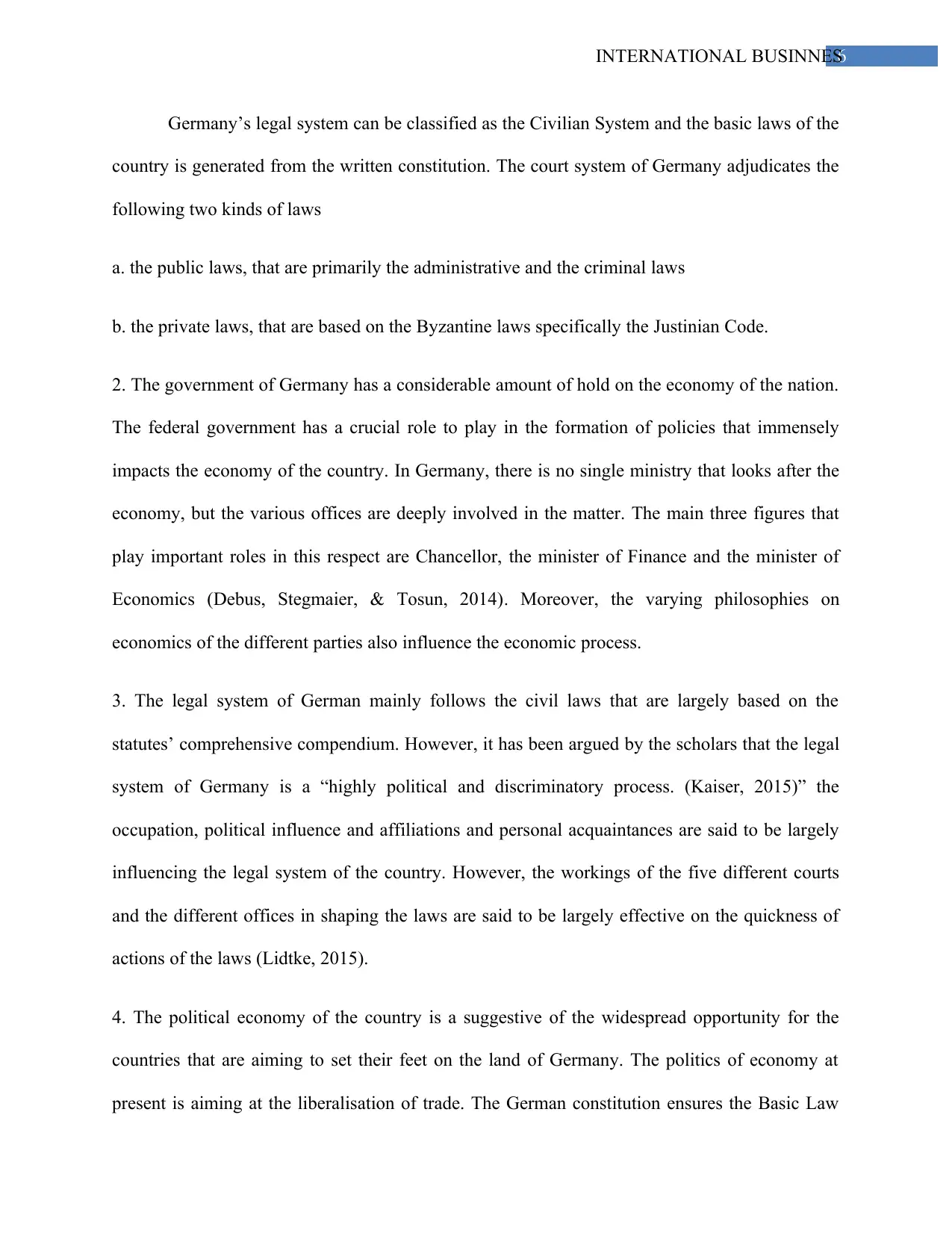
6INTERNATIONAL BUSINNES
Germany’s legal system can be classified as the Civilian System and the basic laws of the
country is generated from the written constitution. The court system of Germany adjudicates the
following two kinds of laws
a. the public laws, that are primarily the administrative and the criminal laws
b. the private laws, that are based on the Byzantine laws specifically the Justinian Code.
2. The government of Germany has a considerable amount of hold on the economy of the nation.
The federal government has a crucial role to play in the formation of policies that immensely
impacts the economy of the country. In Germany, there is no single ministry that looks after the
economy, but the various offices are deeply involved in the matter. The main three figures that
play important roles in this respect are Chancellor, the minister of Finance and the minister of
Economics (Debus, Stegmaier, & Tosun, 2014). Moreover, the varying philosophies on
economics of the different parties also influence the economic process.
3. The legal system of German mainly follows the civil laws that are largely based on the
statutes’ comprehensive compendium. However, it has been argued by the scholars that the legal
system of Germany is a “highly political and discriminatory process. (Kaiser, 2015)” the
occupation, political influence and affiliations and personal acquaintances are said to be largely
influencing the legal system of the country. However, the workings of the five different courts
and the different offices in shaping the laws are said to be largely effective on the quickness of
actions of the laws (Lidtke, 2015).
4. The political economy of the country is a suggestive of the widespread opportunity for the
countries that are aiming to set their feet on the land of Germany. The politics of economy at
present is aiming at the liberalisation of trade. The German constitution ensures the Basic Law
Germany’s legal system can be classified as the Civilian System and the basic laws of the
country is generated from the written constitution. The court system of Germany adjudicates the
following two kinds of laws
a. the public laws, that are primarily the administrative and the criminal laws
b. the private laws, that are based on the Byzantine laws specifically the Justinian Code.
2. The government of Germany has a considerable amount of hold on the economy of the nation.
The federal government has a crucial role to play in the formation of policies that immensely
impacts the economy of the country. In Germany, there is no single ministry that looks after the
economy, but the various offices are deeply involved in the matter. The main three figures that
play important roles in this respect are Chancellor, the minister of Finance and the minister of
Economics (Debus, Stegmaier, & Tosun, 2014). Moreover, the varying philosophies on
economics of the different parties also influence the economic process.
3. The legal system of German mainly follows the civil laws that are largely based on the
statutes’ comprehensive compendium. However, it has been argued by the scholars that the legal
system of Germany is a “highly political and discriminatory process. (Kaiser, 2015)” the
occupation, political influence and affiliations and personal acquaintances are said to be largely
influencing the legal system of the country. However, the workings of the five different courts
and the different offices in shaping the laws are said to be largely effective on the quickness of
actions of the laws (Lidtke, 2015).
4. The political economy of the country is a suggestive of the widespread opportunity for the
countries that are aiming to set their feet on the land of Germany. The politics of economy at
present is aiming at the liberalisation of trade. The German constitution ensures the Basic Law
Paraphrase This Document
Need a fresh take? Get an instant paraphrase of this document with our AI Paraphraser
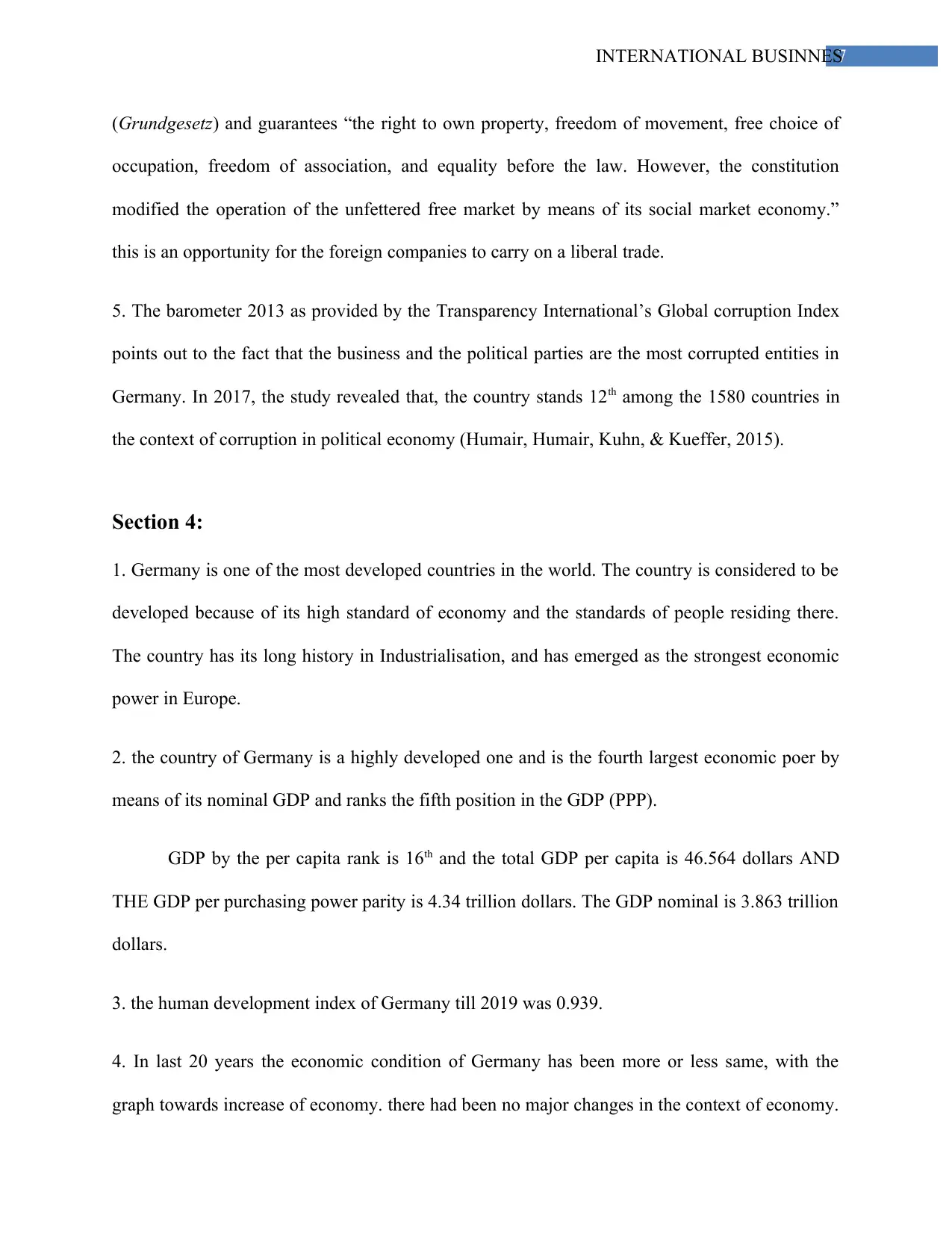
7INTERNATIONAL BUSINNES
(Grundgesetz) and guarantees “the right to own property, freedom of movement, free choice of
occupation, freedom of association, and equality before the law. However, the constitution
modified the operation of the unfettered free market by means of its social market economy.”
this is an opportunity for the foreign companies to carry on a liberal trade.
5. The barometer 2013 as provided by the Transparency International’s Global corruption Index
points out to the fact that the business and the political parties are the most corrupted entities in
Germany. In 2017, the study revealed that, the country stands 12th among the 1580 countries in
the context of corruption in political economy (Humair, Humair, Kuhn, & Kueffer, 2015).
Section 4:
1. Germany is one of the most developed countries in the world. The country is considered to be
developed because of its high standard of economy and the standards of people residing there.
The country has its long history in Industrialisation, and has emerged as the strongest economic
power in Europe.
2. the country of Germany is a highly developed one and is the fourth largest economic poer by
means of its nominal GDP and ranks the fifth position in the GDP (PPP).
GDP by the per capita rank is 16th and the total GDP per capita is 46.564 dollars AND
THE GDP per purchasing power parity is 4.34 trillion dollars. The GDP nominal is 3.863 trillion
dollars.
3. the human development index of Germany till 2019 was 0.939.
4. In last 20 years the economic condition of Germany has been more or less same, with the
graph towards increase of economy. there had been no major changes in the context of economy.
(Grundgesetz) and guarantees “the right to own property, freedom of movement, free choice of
occupation, freedom of association, and equality before the law. However, the constitution
modified the operation of the unfettered free market by means of its social market economy.”
this is an opportunity for the foreign companies to carry on a liberal trade.
5. The barometer 2013 as provided by the Transparency International’s Global corruption Index
points out to the fact that the business and the political parties are the most corrupted entities in
Germany. In 2017, the study revealed that, the country stands 12th among the 1580 countries in
the context of corruption in political economy (Humair, Humair, Kuhn, & Kueffer, 2015).
Section 4:
1. Germany is one of the most developed countries in the world. The country is considered to be
developed because of its high standard of economy and the standards of people residing there.
The country has its long history in Industrialisation, and has emerged as the strongest economic
power in Europe.
2. the country of Germany is a highly developed one and is the fourth largest economic poer by
means of its nominal GDP and ranks the fifth position in the GDP (PPP).
GDP by the per capita rank is 16th and the total GDP per capita is 46.564 dollars AND
THE GDP per purchasing power parity is 4.34 trillion dollars. The GDP nominal is 3.863 trillion
dollars.
3. the human development index of Germany till 2019 was 0.939.
4. In last 20 years the economic condition of Germany has been more or less same, with the
graph towards increase of economy. there had been no major changes in the context of economy.
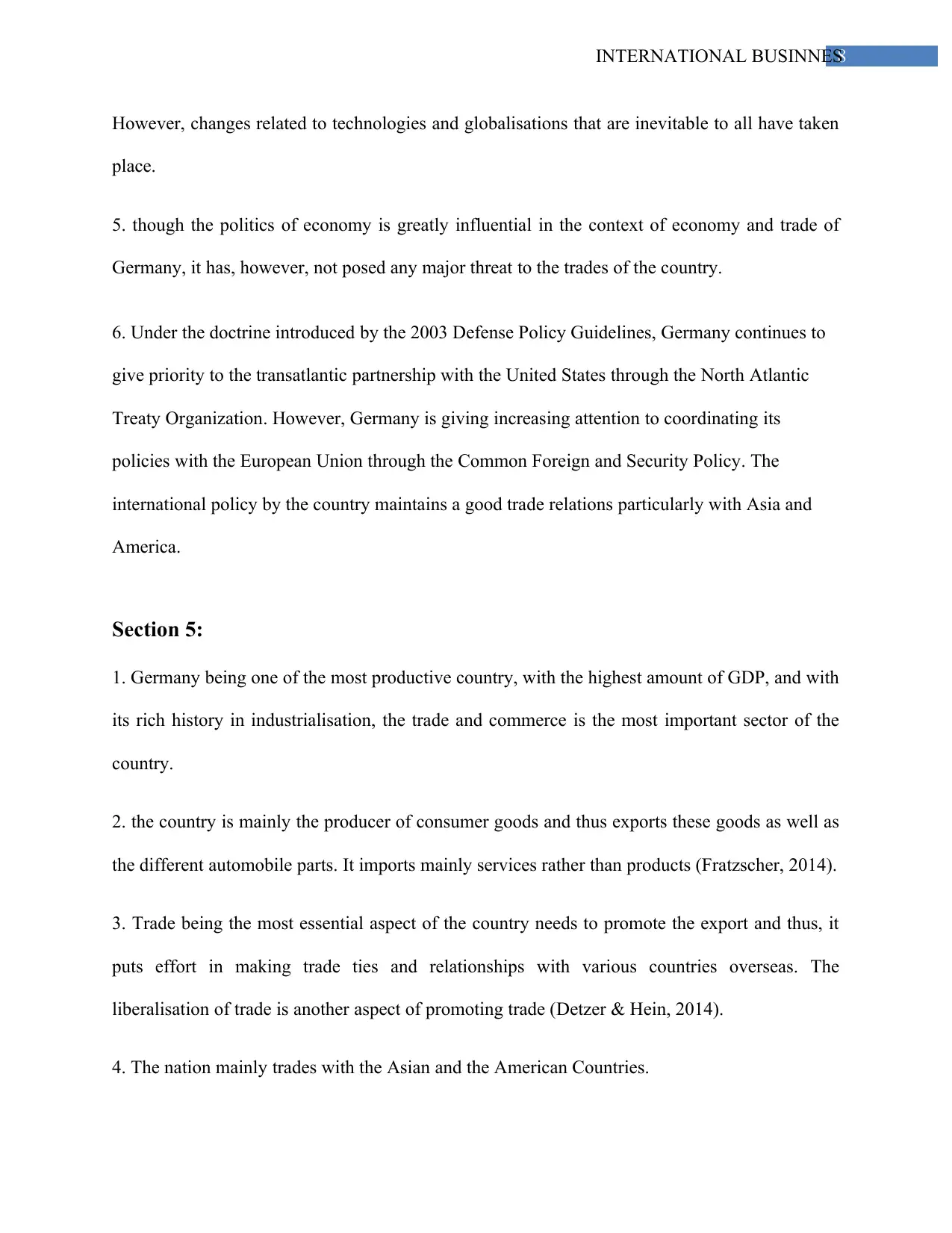
8INTERNATIONAL BUSINNES
However, changes related to technologies and globalisations that are inevitable to all have taken
place.
5. though the politics of economy is greatly influential in the context of economy and trade of
Germany, it has, however, not posed any major threat to the trades of the country.
6. Under the doctrine introduced by the 2003 Defense Policy Guidelines, Germany continues to
give priority to the transatlantic partnership with the United States through the North Atlantic
Treaty Organization. However, Germany is giving increasing attention to coordinating its
policies with the European Union through the Common Foreign and Security Policy. The
international policy by the country maintains a good trade relations particularly with Asia and
America.
Section 5:
1. Germany being one of the most productive country, with the highest amount of GDP, and with
its rich history in industrialisation, the trade and commerce is the most important sector of the
country.
2. the country is mainly the producer of consumer goods and thus exports these goods as well as
the different automobile parts. It imports mainly services rather than products (Fratzscher, 2014).
3. Trade being the most essential aspect of the country needs to promote the export and thus, it
puts effort in making trade ties and relationships with various countries overseas. The
liberalisation of trade is another aspect of promoting trade (Detzer & Hein, 2014).
4. The nation mainly trades with the Asian and the American Countries.
However, changes related to technologies and globalisations that are inevitable to all have taken
place.
5. though the politics of economy is greatly influential in the context of economy and trade of
Germany, it has, however, not posed any major threat to the trades of the country.
6. Under the doctrine introduced by the 2003 Defense Policy Guidelines, Germany continues to
give priority to the transatlantic partnership with the United States through the North Atlantic
Treaty Organization. However, Germany is giving increasing attention to coordinating its
policies with the European Union through the Common Foreign and Security Policy. The
international policy by the country maintains a good trade relations particularly with Asia and
America.
Section 5:
1. Germany being one of the most productive country, with the highest amount of GDP, and with
its rich history in industrialisation, the trade and commerce is the most important sector of the
country.
2. the country is mainly the producer of consumer goods and thus exports these goods as well as
the different automobile parts. It imports mainly services rather than products (Fratzscher, 2014).
3. Trade being the most essential aspect of the country needs to promote the export and thus, it
puts effort in making trade ties and relationships with various countries overseas. The
liberalisation of trade is another aspect of promoting trade (Detzer & Hein, 2014).
4. The nation mainly trades with the Asian and the American Countries.
⊘ This is a preview!⊘
Do you want full access?
Subscribe today to unlock all pages.

Trusted by 1+ million students worldwide
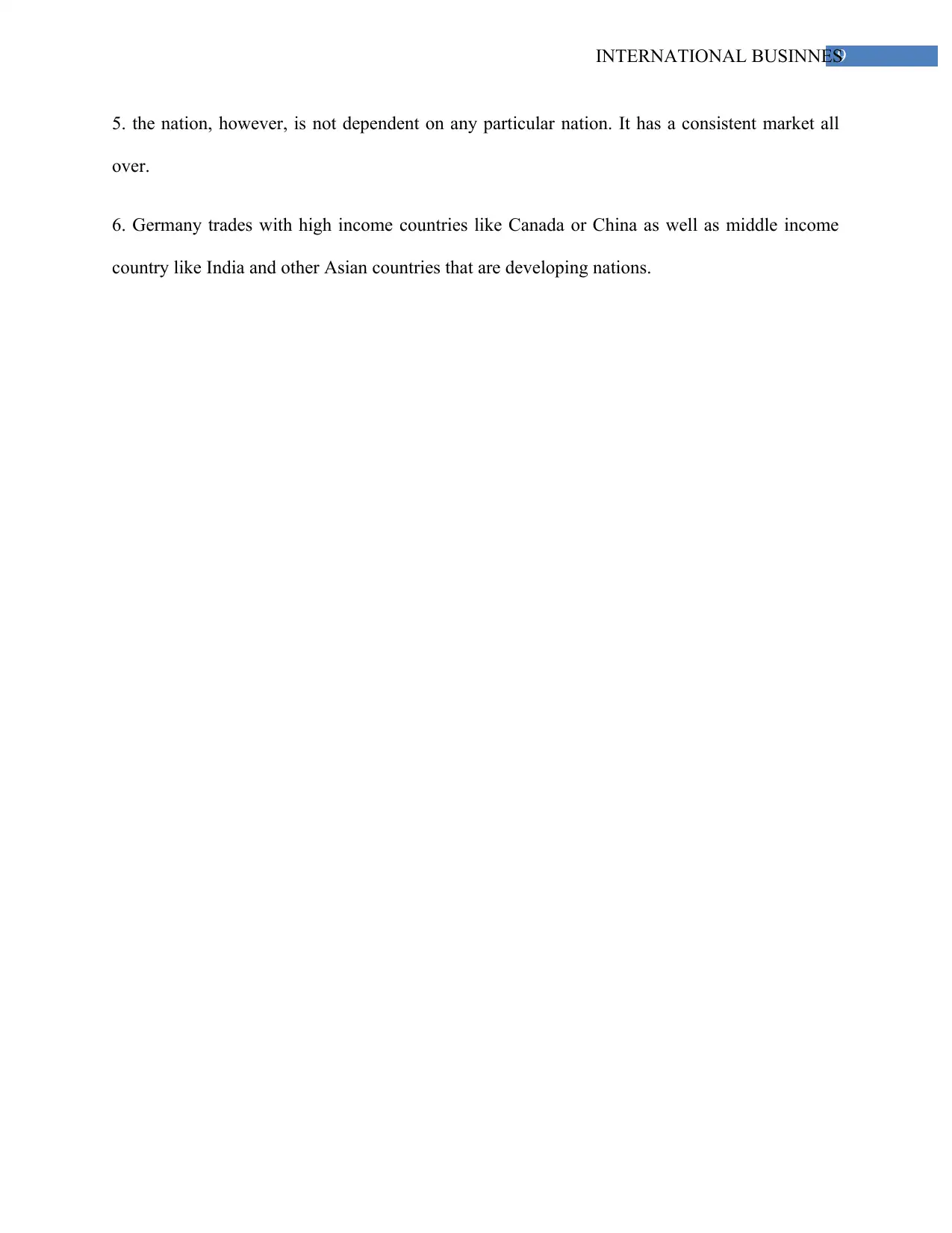
9INTERNATIONAL BUSINNES
5. the nation, however, is not dependent on any particular nation. It has a consistent market all
over.
6. Germany trades with high income countries like Canada or China as well as middle income
country like India and other Asian countries that are developing nations.
5. the nation, however, is not dependent on any particular nation. It has a consistent market all
over.
6. Germany trades with high income countries like Canada or China as well as middle income
country like India and other Asian countries that are developing nations.
Paraphrase This Document
Need a fresh take? Get an instant paraphrase of this document with our AI Paraphraser
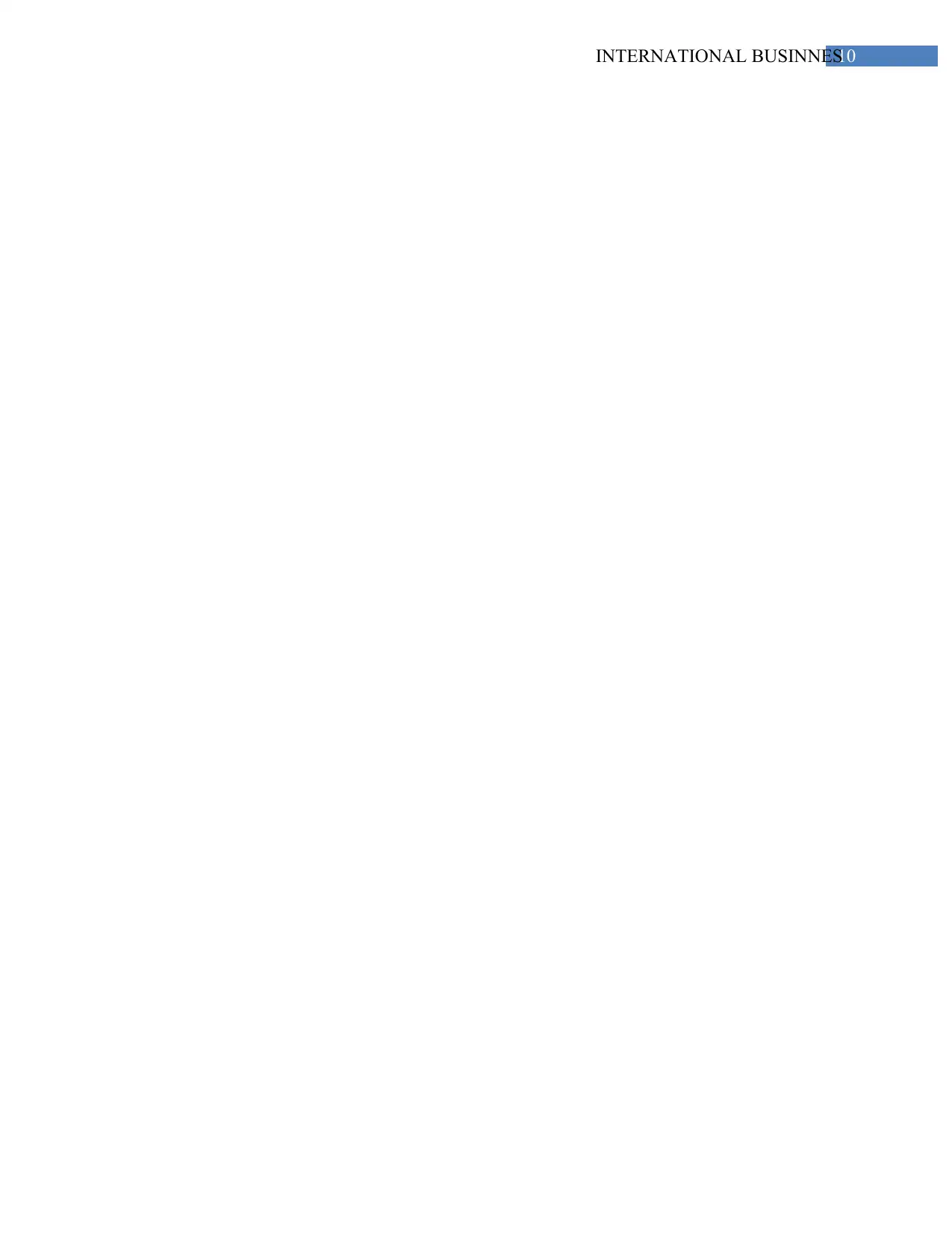
10INTERNATIONAL BUSINNES
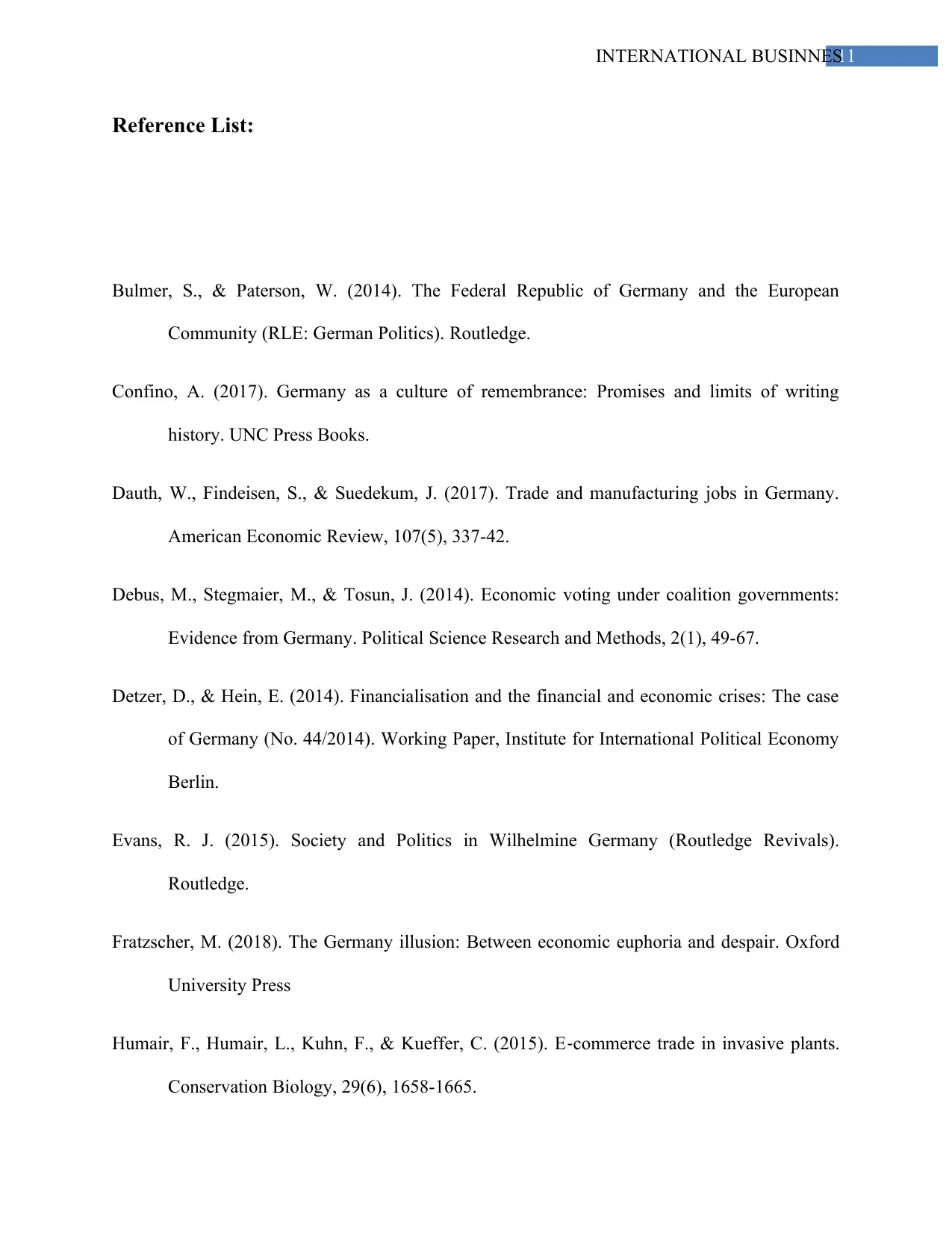
11INTERNATIONAL BUSINNES
Reference List:
Bulmer, S., & Paterson, W. (2014). The Federal Republic of Germany and the European
Community (RLE: German Politics). Routledge.
Confino, A. (2017). Germany as a culture of remembrance: Promises and limits of writing
history. UNC Press Books.
Dauth, W., Findeisen, S., & Suedekum, J. (2017). Trade and manufacturing jobs in Germany.
American Economic Review, 107(5), 337-42.
Debus, M., Stegmaier, M., & Tosun, J. (2014). Economic voting under coalition governments:
Evidence from Germany. Political Science Research and Methods, 2(1), 49-67.
Detzer, D., & Hein, E. (2014). Financialisation and the financial and economic crises: The case
of Germany (No. 44/2014). Working Paper, Institute for International Political Economy
Berlin.
Evans, R. J. (2015). Society and Politics in Wilhelmine Germany (Routledge Revivals).
Routledge.
Fratzscher, M. (2018). The Germany illusion: Between economic euphoria and despair. Oxford
University Press
Humair, F., Humair, L., Kuhn, F., & Kueffer, C. (2015). E‐commerce trade in invasive plants.
Conservation Biology, 29(6), 1658-1665.
Reference List:
Bulmer, S., & Paterson, W. (2014). The Federal Republic of Germany and the European
Community (RLE: German Politics). Routledge.
Confino, A. (2017). Germany as a culture of remembrance: Promises and limits of writing
history. UNC Press Books.
Dauth, W., Findeisen, S., & Suedekum, J. (2017). Trade and manufacturing jobs in Germany.
American Economic Review, 107(5), 337-42.
Debus, M., Stegmaier, M., & Tosun, J. (2014). Economic voting under coalition governments:
Evidence from Germany. Political Science Research and Methods, 2(1), 49-67.
Detzer, D., & Hein, E. (2014). Financialisation and the financial and economic crises: The case
of Germany (No. 44/2014). Working Paper, Institute for International Political Economy
Berlin.
Evans, R. J. (2015). Society and Politics in Wilhelmine Germany (Routledge Revivals).
Routledge.
Fratzscher, M. (2018). The Germany illusion: Between economic euphoria and despair. Oxford
University Press
Humair, F., Humair, L., Kuhn, F., & Kueffer, C. (2015). E‐commerce trade in invasive plants.
Conservation Biology, 29(6), 1658-1665.
⊘ This is a preview!⊘
Do you want full access?
Subscribe today to unlock all pages.

Trusted by 1+ million students worldwide
1 out of 13
Related Documents
Your All-in-One AI-Powered Toolkit for Academic Success.
+13062052269
info@desklib.com
Available 24*7 on WhatsApp / Email
![[object Object]](/_next/static/media/star-bottom.7253800d.svg)
Unlock your academic potential
Copyright © 2020–2026 A2Z Services. All Rights Reserved. Developed and managed by ZUCOL.




